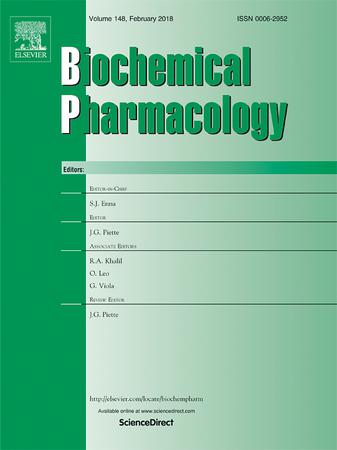A novel IgD-FcδR blocker, IgD-Fc-Ig fusion protein, effectively alleviates abnormal activation of T cells the disease progression in systemic lupus erythematosus
IF 5.3
2区 医学
Q1 PHARMACOLOGY & PHARMACY
引用次数: 0
Abstract
Systemic lupus erythematosus (SLE) is a chronic, multi-organ autoimmune disease with complex pathogenesis and unclear causes. Elevated levels of IgD have been observed in the peripheral blood of SLE patients, suggesting a potential role for IgD through its interaction with the IgD Fc receptor (FcδR). This study aimed to explore the impact of IgD on T cell function in SLE and evaluate the therapeutic potential of targeting the IgD-FcδR pathway using an IgD-Fc-Ig fusion protein. In SLE patients, biomarkers such as BAFF, ESR, anti-dsDNA and SLEDAI-2k, which are used to assess disease activity and clinical presentations, were significantly correlated with sIgD levels. As an IgD-FcδR blocker, IgD-Fc-Ig effectively suppressed the activation and proliferation of CD4+ T cells stimulated by IgD, restored the balance between Th17 and Treg cell subsets, and reduced the expression and interaction of phosphorylated Lck (p-Lck) and JAK2 (p-JAK2). Moreover, in vivo study demonstrated that IgD-Fc-Ig may also ameliorates disease manifestations in MRL/lpr mice with lupus nephritis. IgD-Fc-Ig could reduce serum IgD levels, proteinuria level and the kidney deposition of immune complex C3, ameliorate histopathological changes in kidney and spleen tissue. Additionally, it reversed the state of excessive activation and imbalance of Th17/Treg cell subsets, reduced cytokine levels, and downregulated p-JAK2 and p-STAT3 expression. In conclusion, our study revealed a correlation between abnormally increased sIgD and SLE pathogenesis, IgD-FcδR-Lck-JAK2-STAT3 may act as an important mechanism contributing to T cell activation in SLE. IgD-Fc-Ig fusion protein may represent a promising targeted therapy for SLE.

求助全文
约1分钟内获得全文
求助全文
来源期刊

Biochemical pharmacology
医学-药学
CiteScore
10.30
自引率
1.70%
发文量
420
审稿时长
17 days
期刊介绍:
Biochemical Pharmacology publishes original research findings, Commentaries and review articles related to the elucidation of cellular and tissue function(s) at the biochemical and molecular levels, the modification of cellular phenotype(s) by genetic, transcriptional/translational or drug/compound-induced modifications, as well as the pharmacodynamics and pharmacokinetics of xenobiotics and drugs, the latter including both small molecules and biologics.
The journal''s target audience includes scientists engaged in the identification and study of the mechanisms of action of xenobiotics, biologics and drugs and in the drug discovery and development process.
All areas of cellular biology and cellular, tissue/organ and whole animal pharmacology fall within the scope of the journal. Drug classes covered include anti-infectives, anti-inflammatory agents, chemotherapeutics, cardiovascular, endocrinological, immunological, metabolic, neurological and psychiatric drugs, as well as research on drug metabolism and kinetics. While medicinal chemistry is a topic of complimentary interest, manuscripts in this area must contain sufficient biological data to characterize pharmacologically the compounds reported. Submissions describing work focused predominately on chemical synthesis and molecular modeling will not be considered for review.
While particular emphasis is placed on reporting the results of molecular and biochemical studies, research involving the use of tissue and animal models of human pathophysiology and toxicology is of interest to the extent that it helps define drug mechanisms of action, safety and efficacy.
 求助内容:
求助内容: 应助结果提醒方式:
应助结果提醒方式:


